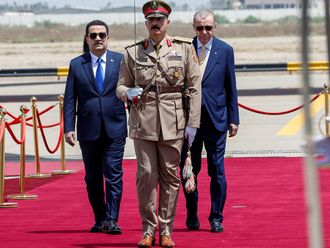Beirut Shaikh Naim Qasim, deputy head of the Hezbollah resistance movement, said he expected Bashar Al Assad to remain president of Syria despite 11 months of protest in which the United Nations says more than 7,500 people have been killed.
"I believe that President [Al] Assad will overcome this period and will remain the president of Syria," he said.
Hezbollah backs Al Assad despite supporting popular uprisings elsewhere in the Arab world. Qasim praised the Arab Spring revolts which overthrew the leaders of Egypt and Tunisia last year, but said that the United States was "trying day and night to hijack those revolutions".
He said the uprisings in Libya and Yemen had started out as popular movements but were pushed off course militarily and politically by the West.
"We hope that popular forces can put an end to foreign exploitation and political exploitation of this movement, he said. "America's criteria in relation to the Arab revolutions are not uniform and have nothing to do with human rights or democracy."
Leadership issue
Hezbollah says Al Assad, who comes from the minority Alawite sect, has introduced reforms in response to demonstrators' demands including Sunday's referendum on a new constitution.
It believes that the collapse of Al Assad's rule would lead to the country fragmenting on sectarian lines. Hezbollah officials also argue there is no credible leadership-in-waiting amongst the divided Syrian opposition that could control the country, and that extremists would impose their agenda after Al Assad's departure.
Accusations
Qasim said the upheaval was largely the work of the United States, which had been "inciting unrest in Syria and providing financial and military aid for use in the violence and killing inside Syria".
"America knows that if there is a war on Iran, this means that the whole region will be set alight, with no limit to the fires," he told Reuters.
He also said Israel would try to drag a reluctant US into confrontation with Tehran. "Israel does not have the capability nor the courage to wage war by itself on Iran, while America has reservations because of the dangers of this war and because of the upcoming [presidential] election," he said.











